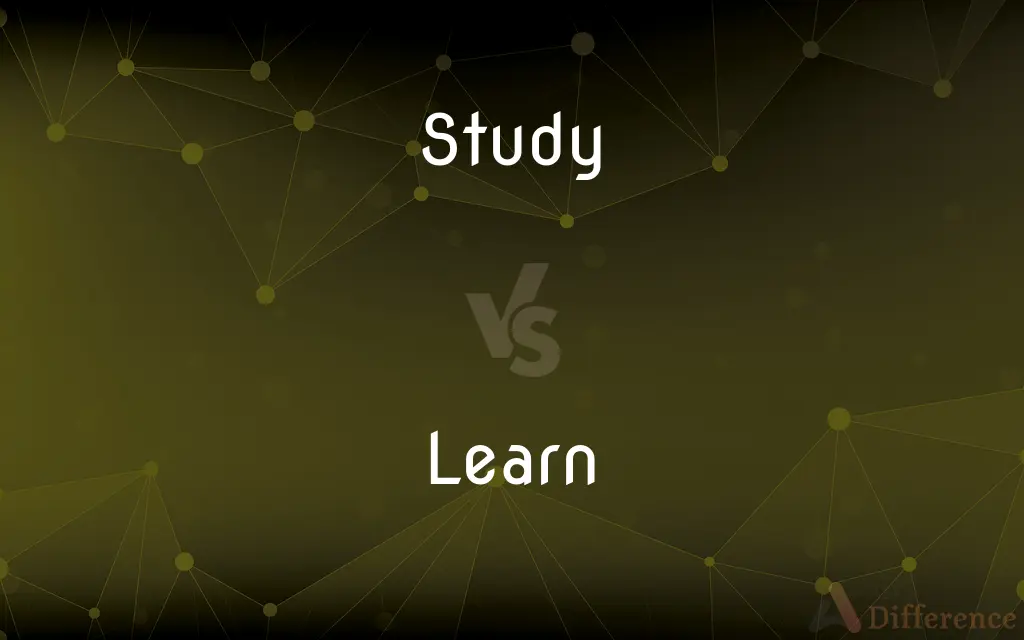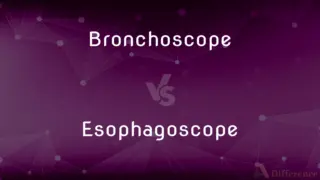Study vs. Learn — What's the Difference?
By Tayyaba Rehman & Urooj Arif — Updated on April 25, 2024
"Study" refers to the process of reviewing and engaging with material to gain knowledge, while "learn" encompasses acquiring knowledge or skills through experience, study, or being taught.

Difference Between Study and Learn
Table of Contents
ADVERTISEMENT
Key Differences
Study involves a deliberate and systematic effort to understand and memorize information, often using tools like books, notes, and other educational resources. On the other hand, learning is a broader, more inclusive term that signifies the acquisition of knowledge or skills through various methods including studying, practicing, or direct experience.
Studying is typically structured and occurs in academic settings, focusing on specific subjects or fields. Whereas learning can happen in any environment, whether structured like a classroom or through informal experiences like conversing with others or personal trials.
While studying is an active pursuit requiring conscious effort, learning can be both an intentional activity and a passive process that happens without deliberate effort.
The effectiveness of studying is often measured through tests and assessments, while learning is demonstrated through the ability to apply knowledge or skills in real-world scenarios.
Comparison Chart
Definition
Engagement with educational material
Acquisition of knowledge or skills
ADVERTISEMENT
Method
Often formal and structured
Can be formal or informal, structured or experiential
Setting
Typically academic
Any setting, including life experiences
Measurement
Tests, assessments
Application and practical use
Effort
Active, requires concentration
Can be active or passive
Compare with Definitions
Study
Academic activity.
She goes to the library to study for her finals.
Learn
Informal acquisition.
She learned a lot about gardening from her neighbor.
Study
Research work.
The team conducts a study on climate change impacts.
Learn
Experiential understanding.
He learned patience from his time volunteering.
Study
Systematic exploration.
They study ancient texts to understand historical contexts.
Learn
Gaining skills.
She learned how to swim at summer camp.
Study
Preparation for assessments.
She had to study hard to pass the certification exam.
Learn
Continuous process.
We never stop learning throughout our lives.
Study
Focused learning.
He studies chemistry every evening.
Learn
To gain knowledge of or skill in through study, instruction, or experience
Learned how to sail.
Learned the new computer program.
Learn to speak Hindi.
Study
The devotion of time and attention to gaining knowledge of an academic subject, especially by means of books
An application to continue full-time study
The study of English
Learn
To become aware or informed of; find out
Learned the truth about him.
Learned that it was best not to argue.
Study
A detailed investigation and analysis of a subject or situation
The study of global problems
A study of a sample of 5,000 children
Learn
To fix in the mind or memory; memorize
Learned the speech in a few hours.
Study
A room used or designed for reading, writing, or academic work
The third bedroom was used as a study
Learn
(Nonstandard) To cause to acquire knowledge; teach.
Study
A piece of work, especially a drawing, done for practice or as an experiment.
Learn
(Obsolete) To give information to.
Study
A thing or person that is an embodiment or good example of something
He perched on the edge of the bed, a study in confusion and misery
Learn
To gain knowledge, information, comprehension, or skill
Learns quickly.
Learned about computers.
Learned of the job through friends.
Study
Devote time and attention to gaining knowledge of (an academic subject), especially by means of books
I studied classics at college
Learn
To acquire, or attempt to acquire knowledge or an ability to do something.
Study
Look at closely in order to observe or read
She bent her head to study the plans
Learn
To attend a course or other educational activity.
Study
Make an effort to achieve (a result) or take into account (a person or their wishes)
With no husband to study, housekeeping is mere play
Learn
To gain knowledge from a bad experience so as to improve.
Learn from one's mistakes
Study
The effort to acquire knowledge, as by reading, observation, or research
The study of language has overturned many misconceptions.
Learn
To study.
I learn medicine.
They learn psychology.
Study
An act or effort made in the pursuit of knowledge
Applied himself to his studies.
Learn
To come to know; to become informed of; to find out.
He just learned that he will be sacked.
Study
A branch of knowledge or department of learning
The study of geography.
Graduate studies.
Learn
To teach.
Give him a clip round the ear. That'll learn him!
Study
Attentive examination or analysis
The new drug is still under study.
Learn
The act of learning something
Study
A detailed examination, analysis, or experiment investigating a subject or phenomenon
Conducted a study of children's reading habits.
Learn
To gain knowledge or information of; to ascertain by inquiry, study, or investigation; to receive instruction concerning; to fix in the mind; to acquire understanding of, or skill; as, to learn the way; to learn a lesson; to learn dancing; to learn to skate; to learn the violin; to learn the truth about something.
Now learn a parable of the fig tree.
Study
A document or publication presenting the results of such an endeavor.
Learn
To communicate knowledge to; to teach.
Hast thou not learned me howTo make perfumes ?
Study
A literary work treating a particular subject or character
The novel is a study of Irish childhood.
Learn
To acquire knowledge or skill; to make progress in acquiring knowledge or skill; to receive information or instruction; as, this child learns quickly.
Take my yoke upon you and learn of me.
Study
A preliminary sketch, as for a work of art or literature.
Learn
Acquire or gain knowledge or skills;
She learned dancing from her sister
I learned Sanskrit
Children acquire language at an amazing rate
Study
(Medicine) A diagnostic test.
Learn
Get to know or become aware of, usually accidentally;
I learned that she has two grown-up children
I see that you have been promoted
Study
(Music) A composition intended as a technical exercise.
Learn
Commit to memory; learn by heart;
Have you memorized your lines for the play yet?
Study
A state of mental absorption
She is in a deep study.
Learn
Be a student of a certain subject;
She is reading for the bar exam
Study
A room intended or equipped for studying or writing.
Learn
Impart skills or knowledge to;
I taught them French
He instructed me in building a boat
Study
A noteworthy or interesting example
He is a study in contradictions.
Learn
Find out, learn, or determine with certainty, usually by making an inquiry or other effort;
I want to see whether she speaks French
See whether it works
Find out if he speaks Russian
Check whether the train leaves on time
Study
To apply one's mind purposefully to the acquisition of knowledge or understanding of (a subject).
Study
To take (a course) at a school.
Study
To try to memorize
Studied the lines for her role in the play.
Study
To perform a study of; investigate
We need to study the problem further.
Study
To read or look at carefully
Studied the map.
Studied his expression.
Study
To give careful thought to; contemplate
Let's study our next move.
Study
(Medicine) To perform a diagnostic test on (a part of the body, for example).
Study
To apply oneself to learning, especially by reading
Studied for the exam.
Study
To pursue a course of study
Studied at Yale.
Study
To ponder; reflect.
Study
To review materials already learned in order to make sure one does not forget them, usually in preparation for an examination.
Students are expected to start studying for final exams in March.
I need to study my biology notes.
Study
(academic) To take a course or courses on a subject.
I study medicine at the university.
Study
To acquire knowledge on a subject with the intention of applying it in practice.
Biologists study living things.
Study
To look at minutely.
He studied the map in preparation for the hike.
Study
To fix the mind closely upon a subject; to dwell upon anything in thought; to muse; to ponder.
Study
To endeavor diligently; to be zealous.
Study
Mental effort to acquire knowledge or learning.
The study of languages is fascinating.
Study
The act of studying or examining; examination.
I made a careful study of his sister.
Study
Any particular branch of learning that is studied; any object of attentive consideration.
Study
A room in a house intended for reading and writing; traditionally the private room of the male head of household.
Father spends all his time in the study poring over manuscripts.
Study
An artwork made in order to practise or demonstrate a subject or technique.
A study of heads or of hands for a figure picture
Study
The human face, bearing an expression which the observer finds amusingly typical of a particular emotion or state of mind.
Geoffrey's face was a study.
Geoffrey's face was a study in amazement [or in bewilderment, irritation, distress etc.]
Study
(music) A piece for special practice; an étude.
Study
(academic) An academic publication.
That new study on noncommutative symmetries looks promising.
Study
One who commits a theatrical part to memory.
Study
(chess) An endgame problem composed for artistic merit, where one side is to play for a win or for a draw.
Study
(obsolete) A state of mental perplexity or worried thought.
Study
(archaic) Thought, as directed to a specific purpose; one's concern.
My study was to avoid disturbing her.
Study
A setting of the mind or thoughts upon a subject; hence, application of mind to books, arts, or science, or to any subject, for the purpose of acquiring knowledge.
Hammond . . . spent thirteen hours of the day in study.
Study gives strength to the mind; conversation, grace.
Study
Mental occupation; absorbed or thoughtful attention; meditation; contemplation.
Just men they seemed, and all their study bentTo worship God aright, and know his works.
Study
Any particular branch of learning that is studied; any object of attentive consideration.
The Holy Scriptures, especially the New Testament, are her daily study.
The proper study of mankind is man.
Study
A building or apartment devoted to study or to literary work.
Study
A representation or rendering of any object or scene intended, not for exhibition as an original work of art, but for the information, instruction, or assistance of the maker; as, a study of heads or of hands for a figure picture.
Study
A piece for special practice. See Etude.
Study
To fix the mind closely upon a subject; to dwell upon anything in thought; to muse; to ponder.
I found a moral first, and then studied for a fable.
Study
To apply the mind to books or learning.
Study
To endeavor diligently; to be zealous.
Study
To apply the mind to; to read and examine for the purpose of learning and understanding; as, to study law or theology; to study languages.
Study
To consider attentively; to examine closely; as, to study the work of nature.
Study thyself; what rank or what degreeThe wise Creator has ordained for thee.
Study
To form or arrange by previous thought; to con over, as in committing to memory; as, to study a speech.
Study
To make an object of study; to aim at sedulously; to devote one's thoughts to; as, to study the welfare of others; to study variety in composition.
For their heart studieth destruction.
Study
A detailed critical inspection
Study
Applying the mind to learning and understanding a subject (especially by reading);
Mastering a second language requires a lot of work
No schools offer graduate study in interior design
Study
A written document describing the findings of some individual or group;
This accords with the recent study by Hill and Dale
Study
A state of deep mental absorption;
She is in a deep study
Study
A room used for reading and writing and studying;
He knocked lightly on the closed door of the study
Study
A branch of knowledge;
In what discipline is his doctorate?
Teachers should be well trained in their subject
Anthropology is the study of human beings
Study
Preliminary drawing for later elaboration;
He made several studies before starting to paint
Study
Attentive consideration and meditation;
After much cogitation he rejected the offer
Study
Someone who memorizes quickly and easily (as the lines for a part in a play);
He is a quick study
Study
A composition intended to develop one aspect of the performer's technique;
A study in spiccato bowing
Study
Consider in detail and subject to an analysis in order to discover essential features or meaning;
Analyze a sonnet by Shakespeare
Analyze the evidence in a criminal trial
Analyze your real motives
Study
Be a student; follow a course of study; be enrolled at an institute of learning
Study
Give careful consideration to;
Consider the possibility of moving
Study
Be a student of a certain subject;
She is reading for the bar exam
Study
Learn by reading books;
He is studying geology in his room
I have an exam next week; I must hit the books now
Study
Think intently and at length, as for spiritual purposes;
He is meditating in his study
Common Curiosities
How does learning occur without studying?
Learning can occur through experiences, observations, and natural interactions, without structured study.
What are some effective studying techniques?
Effective studying techniques include summarization, mnemonic devices, practice tests, and group discussions.
What is the primary goal of studying?
The primary goal of studying is to acquire and understand information systematically and prepare for assessments.
Is it possible to learn something unintentionally?
Yes, people often learn unintentionally through experiences and interactions in their daily lives.
Why is it important to balance studying and practical application?
Balancing studying and practical application helps in solidifying knowledge and improving the ability to use that knowledge effectively.
Can studying guarantee learning?
Studying does not guarantee learning; effective studying techniques and understanding are necessary to truly learn.
How can learning be assessed without tests?
Learning can be assessed through practical applications, project work, presentations, and continuous performance evaluations.
What is lifelong learning?
Lifelong learning refers to the continuous, voluntary pursuit of knowledge for personal or professional reasons throughout a person's life.
How do people measure learning in informal settings?
In informal settings, learning is often measured by an individual’s ability to apply new knowledge or skills in real-life situations.
How does one's environment affect their ability to study and learn?
The environment can significantly affect studying and learning by influencing concentration, motivation, and access to resources.
What is the difference between studying and cramming?
Studying is systematic and planned, while cramming involves hurried and intensive studying just before an exam.
How do educators facilitate learning beyond studying?
Educators facilitate learning by providing practical applications, encouraging exploration, and fostering a supportive learning environment.
What role does curiosity play in learning?
Curiosity drives the desire to explore and understand, which is a fundamental component of learning.
Can technology enhance studying and learning?
Yes, technology can enhance studying and learning by providing access to vast resources, interactive tools, and personalized learning experiences.
Share Your Discovery

Previous Comparison
Bronchoscope vs. Esophagoscope
Next Comparison
Shorts vs. JortsAuthor Spotlight
Written by
Tayyaba RehmanTayyaba Rehman is a distinguished writer, currently serving as a primary contributor to askdifference.com. As a researcher in semantics and etymology, Tayyaba's passion for the complexity of languages and their distinctions has found a perfect home on the platform. Tayyaba delves into the intricacies of language, distinguishing between commonly confused words and phrases, thereby providing clarity for readers worldwide.
Co-written by
Urooj ArifUrooj is a skilled content writer at Ask Difference, known for her exceptional ability to simplify complex topics into engaging and informative content. With a passion for research and a flair for clear, concise writing, she consistently delivers articles that resonate with our diverse audience.
















































